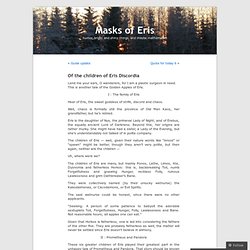

Goddess A Day - My quest for the ten thousand names of the Goddess. Goddess Names M. Eris (mythology) In Hesiod's Works and Days 11–24, two different goddesses named Eris are distinguished: So, after all, there was not one kind of Strife alone, but all over the earth there are two.
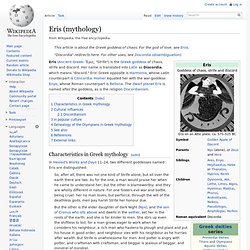
As for the one, a man would praise her when he came to understand her; but the other is blameworthy: and they are wholly different in nature. For one fosters evil war and battle, being cruel: her no man loves; but perforce, through the will of the deathless gods, men pay harsh Strife her honour due. In Hesiod's Theogony, (226–232) Strife, the daughter of Night is less kindly spoken of as she brings forth other personifications as her children: The other Strife is presumably she who appears in Homer's Iliad Book IV; equated with Enyo as sister of Ares and so presumably daughter of Zeus and Hera: Strife whose wrath is relentless, she is the sister and companion of murderous Ares, she who is only a little thing at the first, but thereafter grows until she strides on the earth with her head striking heaven. The Virgin Goddesses. There are at least two interesting questions raised by the Olympian virgins: 1) Why are half of the Pantheon's goddesses, and the vast majority of the subsidiary divine females, virgins, when marriage is the central focus of the Greek woman's life, and perpetual virginity is not an option?
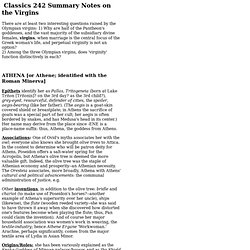
2) Among the three Olympian virgins, does 'virginity' function distinctively in each? ATHENA [or Athene; identified with the Roman Minerva] Epithets identify her as Pallas, Tritogeneia (born at Lake Triton [Tritonis]? On the 3rd day? As the 3rd child?) Associations: One of Ovid's myths associates her with the owl; everyone also knows she brought olive trees to Attica. Other inventions, in addition to the olive tree: bridle and chariot (to make use of Poseidon's horses? Origins/Roles: she has been variously explained as the Snake Goddess of Minoan palaces/houses and as the Shield Deity of Mycenaean fortresses.
Paradoxes and Problems: her 'masculinity'--a gender-bending or 'bi-gendered' goddess-- Persephone. Persephone as a vegetation goddess and her mother Demeter were the central figures of the Eleusinian mysteries that predated the Olympian pantheon and promised the initiated a more enjoyable prospect after death.
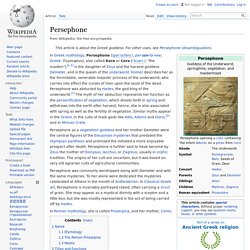
Persephone is further said to have become by Zeus the mother of Dionysus, Iacchus, or Zagreus, usually in orphic tradition. The origins of her cult are uncertain, but it was based on very old agrarian cults of agricultural communities. Name[edit] Etymology[edit] Persephone or "the deceased woman" holding a pomegranate. Persephatta (Περσεφάττα) is considered to mean "female thresher of corn," going by "perso-" relating to Sanskrit "parsa", "sheaf of corn" and the second constituent of the name originating in Proto-Indo European *-gʷʰn-t-ih, from the root *gʷʰen "to strike".[8] An alternative etymology is from φέρειν φόνον, pherein phonon, "to bring (or cause) death".[9]
Rape of Persephone. Nyx. Nyx (Greek: Νύξ, "Night")[1] – Roman (in Latin): Nox – is the Greek goddess (or personification) of the night.
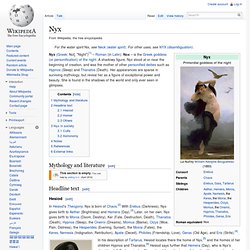
A shadowy figure, Nyx stood at or near the beginning of creation, and was the mother of other personified deities such as Hypnos (Sleep) and Thanatos (Death). Her appearances are sparse in surviving mythology, but reveal her as a figure of exceptional power and beauty. She is found in the shadows of the world and only ever seen in glimpses. Mythology and literature[edit] Headline text[edit] Hesiod[edit] In his description of Tartarus, Hesiod locates there the home of Nyx,[5] and the homes of her children Hypnos and Thanatos.[6] Hesiod says further that Hemera (Day), who is Nyx's daughter, left Tartarus just as Nyx entered it; continuing cyclicly, when Hemera returned, Nyx left.[7] This mirrors the portrayal of Ratri (night) in the Rigveda, where she works in close cooperation but also tension with her sister Ushas (dawn).
Homer[edit] Others[edit] Of the children of Eris Discordia. Lend me your ears, O wanderers, for I am a plastic surgeon in need.
